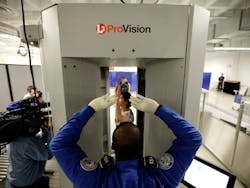May 09--Despite the controversy over whether they pose a health risk, the Transportation Security Administration says it may purchase even more airport scanners that emit radiation to check passengers.
TSA spokesman Jonathan Allen said in coming months the agency plans to test software that would allow radiation-emitting scanners, known as backscatter units, to generate generic body images. Currently, these units generate naked images of passengers that resemble chalk etchings.
"When that software meets TSA's standards and is successfully tested in an airport environment, TSA could purchase and deploy additional backscatter units," he said.
The TSA says scanners are critical to its efforts to thwart potential terrorism attempts, in addition to making passenger screening more efficient. The agency stepped up its use of scanners after an al-Qaida operative attempted to detonate a bomb in his underwear aboard an Amsterdam-to-Detroit flight in December 2009.
This week, the CIA thwarted a similar plot in Yemen, although U.S. counter-terrorism officials are investigating whether scanners would have detected the new bomb since it had no metal parts, according to The Associated Press.
The TSA relies on two kinds of scanners: the backscatter machines, which use radiation, and millimeter wave scanners, which are considered safer because they do not.
The backscatter machines are installed at the Fort Lauderdale-Hollywood and Orlando international airports. The millimeter wave scanners are used at the Palm Beach and Miami international airports.
In November, the European Union banned the backscatter units, fearing they held potential to cause cancer in some passengers. That prompted Broward County officials to question whether they should be allowed at Fort Lauderdale-Hollywood International Airport.
Broward Mayor John Rodstrom, a frequent flier who refuses to go through scanners, said he was disappointed the TSA is considering buying more backscatter scanners.
"I find it unfortunate in the respect that radiation cannot be in any way good for you," he said. "Given that they have an alternative, and why they won't embrace that alternative, is beyond me."
TSA administrator John Pistole said the agency has conducted "intense research, analysis and independent testing" and concluded the units pose no danger.
He said a person could receive 5,000 airport screenings every year without exceeding the radiation does limit set by the American National Standards Institute/Health Physics Society.
"This would require an average of 15 screenings a day, every day, for a year," Pistole wrote in a letter to Kent George, director of the Broward County Aviation Department. "In fact, the average person receives more radiation from the natural environment each hour than from one screening by a backscatter system." .
Some medical experts disagree, saying that the ionizing radiation of the units creates a risk for women genetically predisposed to breast cancer and people over age 65.
Among the experts is Dr. Edward Dauer, head of radiology at Florida Medical Center in Fort Lauderdale. He said ionizing radiation breaks down electrons and DNA, which can cause death or cancer.
His concerns were echoed by to a group of scientists from the University of California, San Francisco. They note the cosmic radiation that infiltrates airliners is absorbed by the whole body and less dangerous than ionizing radiation of the scanners, which only goes skin deep.
Passengers can opt to bypass the body scanners but then are subject to a secondary screening and possibly a pat-down. Allen said about 1 percent of air travelers avoid the scanners, and don't have to cite a reason why.
In all, the TSA has installed about 700 body scanners at 180 U.S. airports. Of those, about 245 are backscatter machines, in use at about 40 airports. About 455 are millimeter-wave scanners in use at about 140 airports.
Allen said in September 2011, the TSA ordered 300 millimeter-wave scanners but no backscatter machines.
Because passengers had complained about scanners capturing naked images, the millimeter scanners are equipped with "automated target recognition," software, which generates generic images to security officers.
The TSA plans to eventually install that software on backscatter scanners as well.
[email protected] or 954-572-2085
Copyright 2012 - Sun Sentinel, Fort Lauderdale, Fla.

